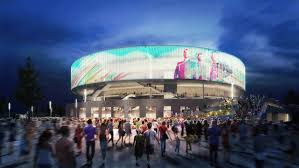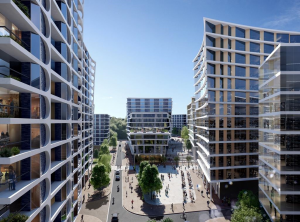Mayor of Bristol Marvin Rees this week confirmed that Bristol’s much-delayed arena will not be built on its original planned site near Temple Meads – ending months of speculation but unleashing a political and social media firestorm.
Mayor Rees had been widely expected to ditch the previously preferred Temple Island plan, pictured, at Tuesday’s city council cabinet meeting. 
But the Labour mayor’s move still provoked a fierce backlash from his political opponents and vocal supporters of the 12,000-capacity arena, who took to Twitter to slam the decision.
Mayor Rees said: “We need to move forward now and ensure Bristol is fit for the demands of a modern, thriving and well connected city. I am confident an alternative development for Temple Island is at the heart of that vision and will create inclusive economic growth, jobs and homes.
Jobs and affordable homes are the key priorities for delivery by my administration and they will come first.
“By not borrowing the huge sums needed to build the arena, we will also release capital for other exciting city projects.I remain committed to delivering an arena for Bristol and we will continue to work closely with our partners to make sure that we make this a reality.”
A number of organisations and senior figures in the city’s business community have backed his decision.

They agree with the Mayor’s assertion that an alternative use announced recently by insurance giant Legal & General, for the derelict council-owned five-acre site – at one time called Arena Island – would be far more beneficial to the city’s economy.
L&G’s plans, pictured, designed by world-renown London-based Zaha-Hadid Architects (ZHA) but which have not yet been submitted to the council, include a large capacity conference centre and exhibition space, a 345-room hotel – which would be the city’s largest – and 550 new homes, nearly half of them designated as affordable – and two major office buildings.
Mayor Rees’ decision paves the way for a larger arena using the Brabazon Hangar at Filton owned by YTL, the Malaysian industrial conglomerate that owns Filton Airfield, where it is developing a major new housing and employment scheme.
Critics of this scheme – which, unlike the Temple Island alternative, does not have planning consent – claim it could lead to traffic chaos when the arena is in use and would also damage the city centre’s economy.
But South West lead director for global property consultancy JLL, Simon Peacock, pictured, who is based in Bristol, said: “Now that a decision has been made not to locate an arena at Temple Island, the council must grasp the opportunity to deliver a well-planned, high-quality and vibrant alternative on this site.

“However, we must also not lose sight of the importance of delivering an arena for the city. The rest of the country is watching Bristol, let’s make sure this long-awaited arena finally happens.”
The plans for an arena at Temple Island had been discussed for at least two decades but gathered pace under previous Mayor of Bristol George Ferguson. Since then around £9m has already been spent in preparation work on the Temple Island site.
However, with the cost of building there spiralling to nearly £190m, a value-for-money report was commissioned by new mayor Marvin Rees from accountancy giant KPMG to analyse the economic cases for and against Temple Island, alternative uses for the site, and the rival Filton location.
It concluded that the council could gain a “significant return” from an alternative use of Temple Island. Just under two weeks ago Bristol Chamber of Commerce publicly entered the debate for the first time by backing the option to build it at Filton.
Its statement was released a day L&G’s plans were unveiled, chamber’s president Richard Bonner said it wanted the “best for the city and the economy of the wider city region”.
He added: “That’s why we support an option that delivers best value derived from the use of public land and borrowing – a high-quality, sustainable mixed development at Temple Island and private sector arena elsewhere, with investment in transport infrastructure.”
In a clear message to critics of the Filton option, including former Mayor Ferguson, he added: “To move forward and explore these options is far from a betrayal of the city; it’s a sensible and pragmatic approach that deserves to succeed.”
The Chamber’s high-profile former chief executive John Savage, who chairs the city’s destination marketing organisation Destination Bristol, also backed an out-of-town arena if it released the Temple Island site for commercial development – a move that he said would bring in funds for the city council at a time when central government money was being slashed and deliver a much-needed conference centre.
Mr Savage said: “The current unfortunate politicisation of a location for an arena as an isolated matter betrays the absolute need to be aware of, and to strive to achieve, the best uses for all of the limited land available.
“There are better uses for the land at Temple Meads and we have a golden offer for provision of an arena elsewhere within the city and completely at the cost of the private sector.”






























